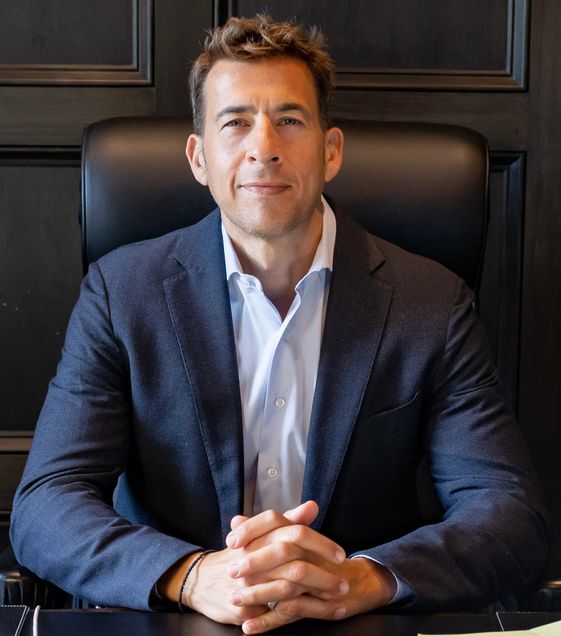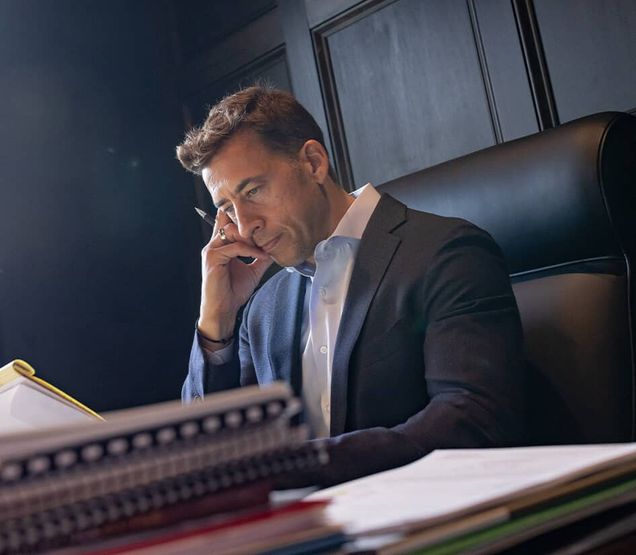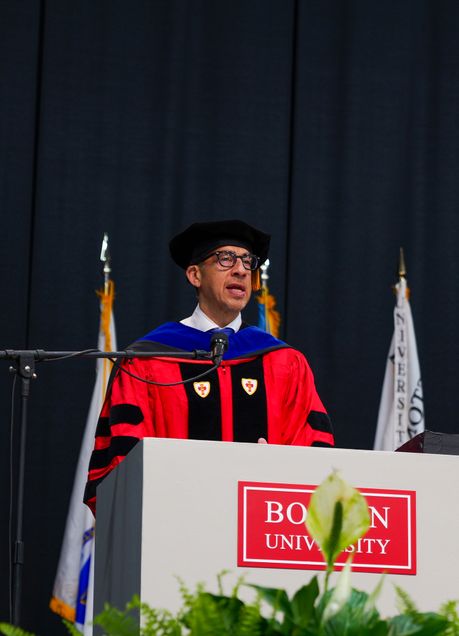Alexi Giannoulias is a Rising Political Star
Illinois secretary of state, and 2025 economics convocation speaker, learned on the BU basketball court and in the econ classroom
Illinois secretary of state, and 2025 economics convocation speaker, learned on the BU basketball court and in the econ classroom
Brotherly love is a strong pull, and it was so strong that it pulled Alexi Giannoulias away from one big city—Chicago—and toward another—Boston—in the late 1990s. Giannoulias (CAS’98), who is now the secretary of state in Illinois, a rising figure in Democratic politics, and a close friend with another famous Illinois-rooted politician, will be back in town on Thursday, May 15, to deliver the convocation speech to the Economics department’s Class of 2025.
Giannoulias came to BU as a transfer student from University of Chicago, and while he was a Terrier, he studied economics and he played on the men’s basketball team, helping lift BU to a 1997 NCAA tournament appearance. At the age of 30, he was elected Illinois state treasurer, the youngest state treasurer in the country, and in 2022 he was elected as Illinois secretary of state.

In advance of his speech, Arts x Sciences caught up with Giannoulias by phone to talk about his rise in politics, the influence his BU education and experience has had on his career, his friendship with Barack Obama, and what lessons he plans to share with the Class of 2025.
Arts x Sciences: Can you talk first about what brought you to Boston University in 1995. You were studying at University of Chicago, so what prompted you to transfer?
Giannoulias: I wanted to play Division I basketball. My brother George (MET’96) was at BU, and when I visited him I really loved the city and the campus and the team and the coach. And it ended up being a great fit. If not for my brother George, I wouldn’t have come to BU.
Was it fun to go to school with your older brother?
We really bonded, it was awesome. We lived together. Those are nice memories. We continued to be close after he graduated. We studied similar things. But I studied more than he did. And you can use that line!
What about your basketball career here?
I loved it, every second of it. I loved my teammates more than anything. A bunch of them flew out when I got elected here. They are very special to me. We love each other and we all care about each other. Practices, watching video, studying, you become like family and that sticks with me more than anything.
What was it that eventually drew you into politics and public service? Was that a goal you had in mind when you came to BU and decided to study economics?
Both my parents were immigrants. They came here with nothing, worked very hard so that I could go to great colleges. I worked hard, of course, but I am a byproduct of the American dream. I always felt compelled to do more because of the struggle my parents went through. I knew that public service would be a major part of my life. I met Barack Obama in high school, at the time, he was a state senator in Illinois. He became my friend, and to see him go on and win [a US Senate seat] like he did became really inspirational for me. I ran against a machine here, and he didn’t think I had any shot of winning but he said, “I’m here with you.” And then when he ran for president, I kept saying “You have no shot of winning, but I’m here with you.” That became sort of a running joke between us.

So it sounds like he was a huge influence on you.
My parents were my inspiration in life, he was my inspiration in politics. To see him become president and bring that transformational hope and belief that anything was possible, that was a motivation for me.
Your office is described as the largest Secretary of State’s office in the country. What does that mean? What’s unique about your office’s role within Illinois that separates it from others in the country?
We have more departments than any other secretary of state office. We run the state library system, driver and vehicle services, we go after white collar criminals, we run organ and tissue donor services. We do a lot of services that others don’t have.
OK, is there one aspect of your job that you love more than any others?
I love helping people, making a difference in people’s lives, bringing innovation to the office.
Can you give me an example of that innovation?
There are a lot. Modernizing the office, moving more of our services online. We introduced kiosks, like DMVs on wheels. It’s been a lot of shock and awe when it comes to introducing new technologies and services.
With all of the rapid changes coming out of Washington, what are the short and long-term impacts on your office of the Trump administration’s efforts to close or shrink aspects of government?
I think it’s fundamentally dangerous, crazy, and offensive what’s coming out of Washington, DC. I don’t say that as a Democrat, I say that as the son of two immigrants who came to America with the promise of success. I hope I’m wrong. This is an attack on our democracy and our planet. We have been the beacon of hope. I think [President Trump] is doing generational damage, it absolutely blows me away. And if a Democrat was doing this, I’d feel the same way.
Has your office been impacted?
Unequivocally yes. And the worst is yet to come. We are the state librarian. Libraries are going to be severely impacted. Who’s against libraries? That’s where kids go to learn and explore. It’s preposterous. Take my Democrat hat off. As someone who believes in democracy, this is wrong.

You’ll be addressing the Class of 2025 in a few weeks—what will be your message to them, without giving away too much of your speech?
My broader theme is, in this day and age, you don’t have to determine your career tomorrow. Not only be cool with that, but embrace it. I hope to take some of the stress out for them. There is a beauty to having different careers. To embrace that uncertainty. I’ve had five different careers and I’m not even 50 yet.
Looking back on your decision to study economics, do you realize now, maybe more than you might have at the time, the importance of understanding economic principles and how it can influence a career path?
I have always believed in optionality. I believed economics could build an infrastructure for me that would allow me to do different things. That’s the part I knew. I didn’t see a lot of downside to having this infrastructure in my brain.
Has the economics background proven helpful to you as secretary of state?
Unequivocally, yes. The way I analyze issues and problems, it absolutely comes into play. And law school was also helpful. A whole other area of thought. They both gave me a great foundation. You want to create options for yourself, so you are not stuck with one set of skills. Be a sponge so you can pick and choose what you want to do.